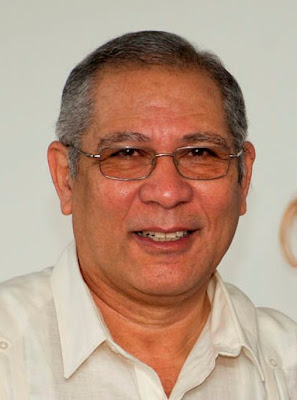Washington Post sobre Cuba: "Quienes mataron a Payá no extinguieron su mensaje". "No hay que confundir falsas imágenes con libertades políticas y económicas", dijo en Washington Rosa María Payá, citada por el diario.
Washington Post: "Quienes mataron a Payá no extinguieron su mensaje"
***********
"No hay que confundir falsas imágenes con libertades políticas y económicas", dijo en Washington Rosa María Payá, citada por el diario.
***********
El diario The Washington Post publicó un nuevo editorial sobre el fallecido líder opositor cubano Oswaldo Payá en el que afirma que para que el futuro de Cuba no se construya sobre un pasado falsificado o una verdad borrada, el primer paso debe ser investigar minuciosamente las muertes de los opositores Payá y Harold Cepero.
El matutino dice que tras esclarecer lo ocurrido en una carretera de Granma el 22 de julio pasado, se podrá avanzar hacia el horizonte de libertad que tanto deseaba Payá,

El Post afirma que quienquiera que haya intentado liquidar a Oswaldo Payá, no pudo extinguir su mensaje, que --dice-- expresó con elocuencia el martes en Washington su hija Rosa María.
La hija de Payá --señala el editorial-- advirtió en la sede del Fondo Nacional para la Democracia que el cambio democrático aún no ha llegado, y que se han impulsado reformas cosméticas para impresionar al mundo y garantizar el poder de los Castro.
"No hay que confundir esas falsas imágenes con libertades políticas y económicas", dijo Rosa María, citada por el diario capitalino.
Sin embargo --agrega el Washington Post-- Rosa María Payá cree que el pueblo cubano siente cada vez menos miedo, y se está acercando a un punto de inflexión que debe abrir el camino hacia una democracia legal, específica y real, sin dar paso a otra forma velada de autoritarismo.
*********
Tomado de http://www.washingtonpost.com
The Post’s View
Oswaldo Payá’s fight for a democratic Cuba lives on
By Editorial Board, Published: April 9
A CAR WRECK on a road outside of Bayamo, Cuba, last July 22 tragically took the life of dissident Oswaldo Payá and youth activist Harold Cepero. The circumstances of their deaths are suspicious and need investigation. But whoever attempted to kill Mr. Payá could not extinguish his message. On Tuesday, a forceful exponent of that message, Mr. Payá’s daughter Rosa Maria, brought it to Washington.
The message is that genuine democratic change of the kind Mr. Payá sought has not yet come to Cuba. Cosmetic “reforms” have been launched, intended to impress the outside world while preserving the Castro regime’s grip on power. Ms. Payá cautioned that these “false images” must not be confused with political and economic freedom, which Cubans do not yet enjoy.
“It would be nice,” Ms. Payá declared at a forum of the National Endowment for Democracy, if people in Cuba could speak freely, travel without restriction, carry out business with whomever they like and live free of the fear of arbitrary arrest or violence. But none of these rights exists. “I’m sorry, but things are not nice right now in my country,” she said, “although a lot of Cubans are working for real change and this is definitely the nice part.”
Indeed, Ms. Payá suggests that Cuba is at an inflection point. Her father worked hard to prepare the groundwork for a transition to democracy. Now, with Fidel and Raul Castro in their sunset years, such a transition is no longer a distant dream. For a decade, Mr. Payá had been working on a petition demanding political freedoms in Cuba. When he presented the petition to the National Assembly in 2002, he had 11,020 signatures; now there are more than 25,000. “My father knew he was close to the moment,” she told us during a visit to The Post Tuesday afternoon.
The transition must make democracy “legal, specific and real,” she declared, and not give way to another thinly veiled brand of authoritarianism. “We don’t need another Russia or China,” she said. “Today, my father’s voice reminds us that all dictatorships have no political color — not right or left, they are only dictatorships.”
For many Cubans who worked with Mr. Payá, these are dangerous times, as the government continues to repress alternative voices and harass those who demand basic rights. There are signs that some people are shedding their fears, Ms. Payá observed, but it is not because the state has loosened its grip. Ms. Payá and her family have been targets of death threats. “We need the international community to pay attention,” she said, not avert its gaze.
For the last few weeks, permitted to travel abroad, Ms. Payá has spoken out courageously in support of her father’s dream of a participatory democracy in Cuba. She has echoed his oft-expressed wish for forgiveness, but Cuba’s future cannot be built on a falsified past or an obliterated truth. The first step is to fully and completely investigate the death of Oswaldo Payá and then to see Cuba toward the new horizon of freedom Mr. Payá envisioned and his daughter so eloquently describes.














0 Comments:
Publicar un comentario
<< Home